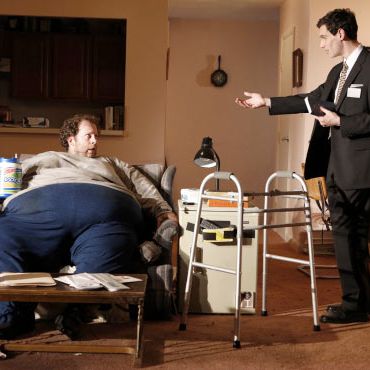
The young playwright Samuel D. Hunter has got a touch of the romantic in him (in the turbid Melvillean, Hawthornean sense) and a pinch of the medieval, too: He’s got a soft spot for the mortification of the flesh. And there’s an awful lot of flesh to mortify in The Whale, Hunter’s extraordinary new almost-parable, near-melodrama about the 600-pound shut-in Charlie (the exceptional Shuler Hensley), a grief-stricken, guilt-racked man seeking a measure of reconciliation with his estranged daughter Ellie (Reyna de Courcy) before he succeeds in eating himself to death. As he did in his breakthrough play A Bright New Boise, Hunter has constructed an outsize, gothic scenario in tender miniature, against a backdrop so blandly bleak we brace ourselves for despair: The sound of cascading highway traffic braids itself with the crashing surf in Charlie’s head. Is it all just too much? Never for a second. Hitting bottom and staying there isn’t Hunter’s game. He’s a naturalist’s supernaturalist, and he’s looking for a net big enough to catch God in. Yet he proceeds with taciturn, plainspoken restraint. Now, there’s a Western voice for you. (And Hunter’s is indubitably his own, not Sam Shepard’s.)
The Whale begins and ends neatly, with the recitation of a schoolkid’s essay on Moby-Dick. (Hunter can be accused of some dramatic tidiness, but it’s a technique, not a crutch, and his tidiness feels like it’s always in service of larger, more mystical intuitions. He’s clearing center stage for the important stuff.) Charlie’s an online writing tutor; he reads phenomenally bad essays all day long. But this one holds a special place in his clogged and failing heart — it’s the only thing keeping it pumping. The essay is wonderfully direct, an honest child’s reduction of Melville: “I was very saddened by this book, and I felt many emotions for the characters. And I felt saddest of all when I read the boring chapters that were only descriptions of whales, because I knew that the author was just trying to save us from his own sad story, just for a little while. This book made me think about my own life … ” Charlie repeats this over and over, a mantra he uses to stave off his increasingly frequent chest pains, and Hensley — his words viscous, smothered, clawing their way to the surface — gives these simple words such saturated color, such depth of feeling, we nearly drown in them.
We fight him at first. Will Charlie pull us down with him? Our early instinct is revulsion. Casually cruel Ellie calls him a “monster,” and this is as accurate a description as any: We recoil from his bulbous grunt, his sweat-stained pits, his rippling excesses. Having lost everything and everyone important to him — including the love of his life, a tormented Mormon named Alan — Charlie has done more than eat his feelings: He’s begun accumulating, with an eye to his legacy. He’s made himself a kind of storehouse of undistributed love. Because, Charlie, you see, is an optimist. The precise terms of his optimism remain mysterious to the many weary women in his life: his caregiver/enabler Liz (Oo-rah’s Cassie Beck, perfectly cast), his ex-wife Mary (a formidable Tasha Lawrence, who blows in for one of the play’s strongest scenes), and, of course, Ellie. And the state of his soul should become a kind of monomania for the young Mormon missionary Elder Thomas (Cock’s Cory Michael Smith, baby-smooth but not wholly guileless).
But Charlie, though practically immobile, eludes every harpoon. Both confined and magnified by Mimi Lien’s brilliant optical illusion of a set (looks like dirty-dishes realism, functions like a fish-eye lens), Charlie makes everything oversize. He and his motives are only a mystery because no one will look at him head-on; they insist on imprinting him with their own mysteries, obsessions, and quests. Yet Charlie’s just looking for a simple, beautiful truth, not a salvation plan or a divine mystery or anything half so complicated. As directed by Hunter’s fellow forced-perspectivist Davis McCallum (who also helmed the marvelously self-contained Boise), The Whale is more than the story of one man’s gothic, grotesque attempt at redemption, more than a story of the search for human community in the postconsumerist wastes, and certainly more than (ack, the gorge rises) a story of acceptance. It’s nothing less than a quiet but firm rejection of our operative American illusions: the smug Lost-esque nonsense gnosticism, the priestly tyranny of punditry, and the resulting schizoid paranoia that’s incensed an end-of-days-obsessed country for over a decade now. Hensley is buried beneath foam, but we feel flesh-to-flesh with him, sans Ahab’s hated “pasteboard mask.” To paraphrase another great American malcontent: If man will strike, strike through the fatsuit!

